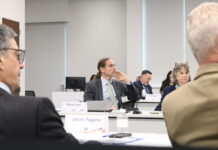
(Georgia Recorder) — The Georgia Board of Education voted Wednesday to unfreeze just over $145 million in federal funds to Georgia school districts for programs like migrant education, teacher training, English acquisition and digital literacy that were in doubt after the Trump administration abruptly paused them at the end of June.
Along with $48 million in grants unfrozen late last month for summer and after-school programs, the state has regained all funds previously delayed by the White House.
In a statement, state school Superintendent Richard Woods expressed relief and thanked the school board and department staff for working to get the funding approved as soon as they got approval from the U.S. Department of Education.
“As I’ve said before, I support both fiscal responsibility and the principle of returning control of education to states and local communities,” Woods said. “That work is only possible when states have timely access to the resources already authorized at the federal level. I’m glad Georgia districts will now have these funds in hand as we get our school year started.”
Speaking at a meeting Wednesday, Georgia DOE Deputy Superintendent of Federal Programs Shaun Owen said her team will be working to get the grant money into the hands of school districts as quickly as possible, but there are procedures they will have to follow.
“We have a process in place and we’ll follow that same process, and that’s that districts will complete their comprehensive needs assessment, and once that’s approved, then they submit the budget, and once that’s approved, then we’ll expedite the funds, but everybody’s ready and available and very anxious to get these funds to the districts as quickly as possible,” she said
School districts get their money to operate from three main sources: federal, state and local.
Georgia Budget and Policy Institute senior education analyst Ashley Young said the federal delays are coming at an inopportune time for Georgia school districts. Some districts are anticipating delays in receiving some state funding because of a change to the state’s financial software, and local money may not be available for a while.
“Local property bills come out maybe September, October, and some of those revenues may be coming late this year, and it may not be until January that schools start to see these payments roll in,” she said. “So we have both state and local delays, and this can be very difficult because many schools, of course, are starting back. They have to meet payroll, starting in July, August, up and through all of these months that they are going to be delayed with these payments.”
That could look different from district to district, but parents may notice changes over previous years.
“If there are hiccups or delays, it could be very well related to these frozen funds not being disseminated at a proper time,” Young said. “So perhaps expect delays, expect program uncertainties, expect some of these things to not run as smoothly as they perhaps typically did in the past, because there just have been a lot of political issues with money getting to the states as needed.”
Georgia Federation of Teachers president Verdaillia Turner said pressure from education advocates on both sides of the aisle helped persuade the administration to renew the funding, but she’s not declaring victory yet because future cuts remain a distinct possibility.
“We don’t want Georgians to think that they can jump up and down and say hooray, because of the temperament of the White House,” Turner said. “Anything could happen at any time in the next four years. But this money was needed, and it was voted on, and we never should have been in this debacle in the first place.”
As the White House plans to wind down the U.S. Department of Education, Turner predicted that local systems will become more active in advocating for federal resources.
“Superintendents are going to have to get active,” she said. “School boards are going to have to be more open also, not relying upon lobbyists. Everybody’s going to have to fight. If you are representing children in any fashion, you’re going to have to fight for the funds and the programs that are necessary for our children to be educated properly in today’s world.”







